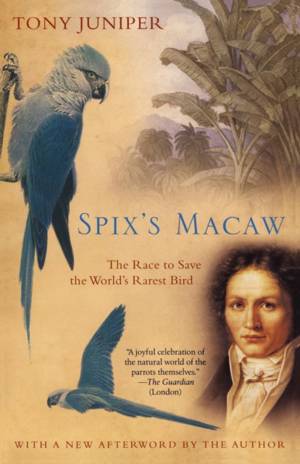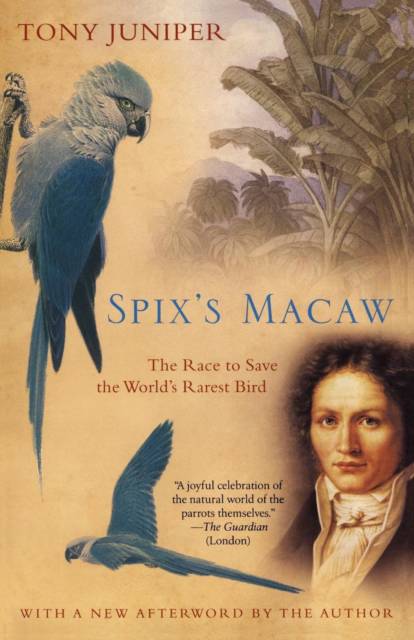
- Afhalen na 1 uur in een winkel met voorraad
- Gratis thuislevering in België vanaf € 30
- Ruim aanbod met 7 miljoen producten
- Afhalen na 1 uur in een winkel met voorraad
- Gratis thuislevering in België vanaf € 30
- Ruim aanbod met 7 miljoen producten
Zoeken
€ 31,45
+ 62 punten
Uitvoering
Omschrijving
The Spix's Macaw, if it survived and recovered, could inspire the world to see what was possiblethrough cooperation and determined efforts to save the earth's natural riches....
On June 3, 1817, Johann Baptist Ritter von Spix set sail for the New World on an expedition sponsored by the Bavarian Royal Academy of Sciences. What he found in Brazil's thorny caatinga woodlands would one day transform our understanding about evolution, survival, and -- in the case of the long-tailed blue parrot now known as "Spix's Macaw" -- extinction.
In this fascinating natural history, esteemed environmentalist Tony Juniper brings the caatinga bird beautifully to life. Not long after Spix's discovery, his parrot -- whose beauty, dexterity, and clear-eyed passion made it a favorite among scientists and bounty hunters alike -- had become more valuable than heroin, and worth thousands of dollars on the black market. By 1990, only one lone male was known to be living in the wild.
Spix's Macaw tells the tale of Juniper's race to save the species, from joining an international rescue operation in the caatinga to calling on private collectors to mate their illegal birds to waiting in vain for a hybrid nest of eggs to hatch. His story brings new meaning to Emily Dickinson's poem "Hope Is the Thing with Feathers."
A heart-stopping homage to the long, lonely flight of the last Spix's Macaw, this is a compassionate addition to the annals of nature literature and an environmental parable for our time.
On June 3, 1817, Johann Baptist Ritter von Spix set sail for the New World on an expedition sponsored by the Bavarian Royal Academy of Sciences. What he found in Brazil's thorny caatinga woodlands would one day transform our understanding about evolution, survival, and -- in the case of the long-tailed blue parrot now known as "Spix's Macaw" -- extinction.
In this fascinating natural history, esteemed environmentalist Tony Juniper brings the caatinga bird beautifully to life. Not long after Spix's discovery, his parrot -- whose beauty, dexterity, and clear-eyed passion made it a favorite among scientists and bounty hunters alike -- had become more valuable than heroin, and worth thousands of dollars on the black market. By 1990, only one lone male was known to be living in the wild.
Spix's Macaw tells the tale of Juniper's race to save the species, from joining an international rescue operation in the caatinga to calling on private collectors to mate their illegal birds to waiting in vain for a hybrid nest of eggs to hatch. His story brings new meaning to Emily Dickinson's poem "Hope Is the Thing with Feathers."
A heart-stopping homage to the long, lonely flight of the last Spix's Macaw, this is a compassionate addition to the annals of nature literature and an environmental parable for our time.
Specificaties
Betrokkenen
- Auteur(s):
- Uitgeverij:
Inhoud
- Aantal bladzijden:
- 304
- Taal:
- Engels
Eigenschappen
- Productcode (EAN):
- 9780743475518
- Verschijningsdatum:
- 16/11/2004
- Uitvoering:
- Paperback
- Formaat:
- Trade paperback (VS)
- Afmetingen:
- 141 mm x 213 mm
- Gewicht:
- 294 g

Alleen bij Standaard Boekhandel
+ 62 punten op je klantenkaart van Standaard Boekhandel
Beoordelingen
We publiceren alleen reviews die voldoen aan de voorwaarden voor reviews. Bekijk onze voorwaarden voor reviews.











